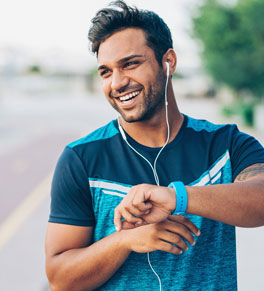Everyday noise pollution leads to hearing damage

Hearing loss was once thought of as an inevitable part of aging or the plight of rock musicians and their concert-going fans.
In fact, one in three Americans are regularly exposed to excessively loud sounds in their everyday lives that can damage hearing, according to the Apple Hearing Study. Defined by the study as anything above 70 decibels, these noises include city traffic and crowded restaurants.
UCI Health otolaryngologist Dr. Hamid R. Djalilian cites such noise pollution above 85 db as the No. 1 cause of preventable hearing loss. He says people, particularly younger individuals, may not understand that damage to the hairs, membranes and nerves of the inner ear is cumulative, that a lifetime of exposure to loud noises will come back to haunt them later.
For instance, one’s hearing may be muffled after going to a club or concert, but “bounce back” to normal within a day or so, he told Healthline.
But as people age and are exposed to more loud noises in daily life, “the damage done in their younger days becomes apparent in hearing tests,” says Djalilian, the director of Otology, Neurotology and Skull Base Surgery Services at UCI Health.
Sources of loud noise
A sound doesn’t have to be especially loud to cause damage. An action movie in a theater can be all it takes, he says.
Other noises that can harm hearing include:
- Construction
- Guns
- Loud music
- Motorcycles
- Power tools
- Powered lawn mowers
- Trucks
- Whistles
Protecting young ears
Hearing preservation, Djalilian says, should start in childhood, when children begin to receive loud toys from well-meaning loved ones.
Every year, he and his team produce a list of the loudest children’s toys, some of which reach 100 decibels or more — almost as loud as a typical rock concert.
“The louder the toy, the shorter the playing time should be,” he advises.
Hearing protection as we age
It’s never too late to start protecting your hearing.
Unfortunately, UCI Health otolaryngologist Dr. Harrison Lin says too few people do so. One-third of people exposed to extremely loud noise at work don’t wear hearing protection and two-thirds of people exposed to loud noises during recreational activities don’t protect their ears.
To minimize the damage and preserve one’s hearing longer, Lin recommends:
- Wearing ear plugs in noisy environments
- Wearing noise-canceling headphones and ear plugs when you’ll be exposed to extremely loud sounds
- Keeping the volume as low as possible when listening to music on audio devices, especially ear buds
Recognizing hearing loss
One of the first signs of damage from exposure to loud noises is tinnitus, is a ringing or some other sound perceived in the ear that isn't from an external source. Another sign of hearing loss is having difficulty in understanding conversation in noisy situations, like at a restaurant, Lin says.
Once people are aware they are experiencing hearing loss or are having trouble understanding what others are say, he advises getting a hearing test and seeing a hearing specialist. Depending on the type and severity of the problem, he says there are many possible treatments, including hearing aids.
"The vast majority of people with mild to moderate hearing loss who wear high-quality hearing aids well-programmed to match their hearing loss will grow to very much appreciate and depend on their hearing aids,” Lin says.




